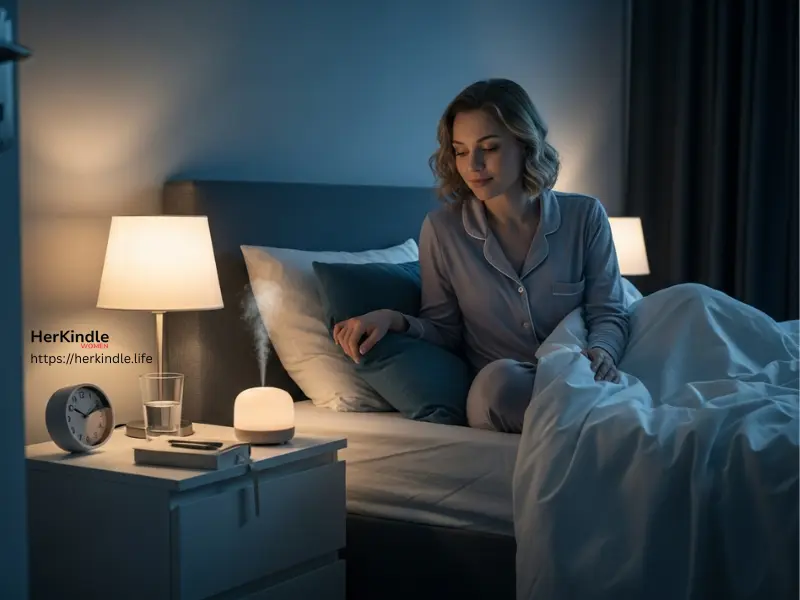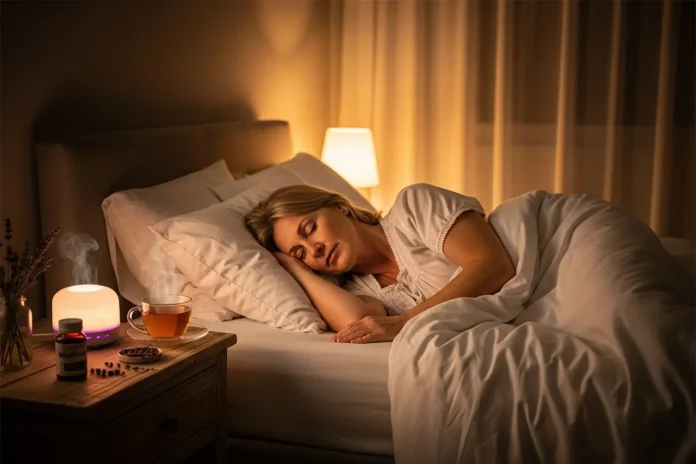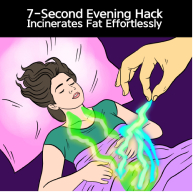📌 Disclaimer:
This article is for informational purposes only and does not constitute medical advice, diagnosis, or treatment.
Always consult your physician, registered dietitian, or qualified healthcare professional before making any changes to your diet, supplements, or medications—especially if you are managing a chronic health condition or undergoing hormonal treatment.
The content shared here is based on reputable research and public health guidelines, but it is not a substitute for personalized medical care.
For many women over 35, sleep is no longer a peaceful escape but a nightly challenge. Between hormonal changes, stress, and the modern lifestyle, quality rest often feels elusive. But sleep is not just a luxury—it is foundational to physical, mental, and emotional health.
This comprehensive guide will explore various sleep aids, both medicinal and natural, along with essential tips on how to sleep better. From best over-the-counter sleep aids to natural sleep remedies and improving sleep hygiene, this post is designed to empower you—women navigating midlife in the US and Canada—with knowledge and practical tools to reclaim your nights.
Understanding the Science of Sleep
Sleep is a dynamic process divided into stages—NREM (non-rapid eye movement) and REM (rapid eye movement). A full sleep cycle lasts about 90 minutes and repeats 4–6 times a night. Each stage plays a distinct role:
- N1 & N2 (Light Sleep): Body begins to relax; metabolism slows.
- N3 (Deep Sleep): Essential for physical restoration and memory consolidation.
- REM Sleep: Vital for emotional regulation and brain function.
Disruptions in these cycles—common with age or lifestyle stress—can significantly impair sleep quality, affecting your health and daily performance.
Types of Sleep Aids: From OTC to Natural Solutions
Over-the-Counter (OTC) Sleep Aids
Best Over-the-Counter Sleep Aid Options include:
- Diphenhydramine (e.g., Benadryl, ZzzQuil)
- Doxylamine Succinate (e.g., Unisom)
These antihistamines work by blocking histamine, a wakefulness neurotransmitter. They are intended for short-term use—ideal for stress-induced insomnia or jet lag—but can cause side effects like:
- Daytime drowsiness
- Dry mouth
- Diminished effectiveness with long-term use
⚠️ Note: Women over 65 are especially sensitive to these side effects and should consult a doctor before use.
Prescription Sleep Aids
Prescription medications are stronger and tailored for chronic insomnia. Categories include:
- Benzodiazepines: Temazepam (Restoril), Triazolam (Halcion)
- Non-benzodiazepine hypnotics: Zolpidem (Ambien), Eszopiclone (Lunesta)
- Melatonin receptor agonists: Ramelteon (Rozerem)
- Orexin receptor antagonists: Suvorexant (Belsomra), Lemborexant (Dayvigo)
Each offers different benefits in helping users fall asleep, stay asleep, or both. However, they carry risks:
- Dependency
- Cognitive impairment
- Next-day grogginess
- Potential interactions with other medications
🩺 Always use under medical supervision—especially during perimenopause or menopause, when sleep disturbances are common.
Natural Sleep Remedies
Many women seek natural sleep remedies to avoid the risks of pharmaceuticals. Common options include:
1. Melatonin Supplements
Helpful for circadian rhythm disruptions (e.g., jet lag), but less effective for general insomnia. Recommended for short-term use.
2. Herbal Teas and Extracts
- Chamomile: Contains apigenin, which binds to sleep-promoting receptors.
- Valerian Root: Mild sedative effects.
- Passionflower and Lavender: Support relaxation and calmness.
3. Tart Cherry Juice
Boosts natural melatonin levels. Shown to improve sleep duration and quality.
4. Magnesium and B6
These nutrients help regulate melatonin and neurotransmitter production. Magnesium also promotes muscle relaxation.
5. Essential Oils (Aromatherapy)
Lavender and bergamot oil, when diffused or applied topically, can lower stress and create a calming pre-sleep environment.
🌿 Natural doesn’t mean risk-free—consult with a provider, especially when pregnant, nursing, or taking other medications.
The Importance of Sleep Hygiene
Sleep hygiene refers to behavioral and environmental habits that support good sleep. Improving sleep hygiene is a foundational solution for chronic sleep issues—often more sustainable than pills.

Key Sleep Hygiene Tips:
- Stick to a sleep schedule: Go to bed and wake up at the same time daily.
- Limit screen time: Avoid blue light from phones and TVs at least 1 hour before bed.
- Create a restful environment: Dark, cool, and quiet spaces improve melatonin release.
- Avoid stimulants and alcohol: Caffeine and alcohol disrupt deep sleep and REM cycles.
- Reserve your bed for sleep only: Reinforce the mental connection between bed and rest.
- Establish wind-down rituals: Light stretching, meditation, or calming music can ease the transition to sleep.
🧘 Practices like yoga and mindfulness meditation have been shown to lower cortisol and promote deeper sleep.
– Advertisement –
- Best Magnesium supplement to support sleep*
- Promotes a balanced stress response, feel relaxed and at peace*
- Improve a healthy immune response*
- Provides an essential electrolyte to maintain healthy rhythm
- Provides a key building block to strong bones*
Cognitive Behavioral Therapy for Insomnia (CBT-I)
When lifestyle changes aren’t enough, CBT-I is considered the gold standard for managing chronic insomnia. It includes:
- Sleep restriction: Reducing time in bed to increase sleep drive
- Stimulus control: Training your brain to associate bed with sleep, not worry or distraction
- Cognitive restructuring: Reframing unhelpful thoughts about sleep
💡 Studies show CBT-I is as effective—or more—than medication with longer-lasting benefits.
The Role of Technology in Better Sleep
Modern sleep tech can support your efforts:
- Wearables (e.g., Fitbit, Oura Ring): Track sleep stages and habits
- Sleep apps: Calm, Headspace, and Sleep Cycle offer guided meditations, soundscapes, and sleep logs
- Smart bedding: Adjusts firmness, temperature, and sleep tracking
📲 Use tech to enhance awareness—not as a replacement for listening to your body.
Potential Side Effects and When to Seek Help
Common Side Effects of Sleep Aids
- Morning grogginess
- Dry mouth
- Dizziness
- Confusion or memory issues
- Increased fall risk (especially for older adults)
Red Flags to Watch For
- Sleepwalking or memory gaps
- Using sleep aids more than 2-3 nights a week
- Needing higher doses over time
Seek professional help if:
- You’ve experienced insomnia for more than 2 weeks
- Your sleep troubles are affecting daily life
- You suspect an underlying condition (e.g., sleep apnea, anxiety)
Sleep Issues in Women Over 35: Special Considerations
Hormonal fluctuations due to perimenopause and menopause often lead to:
- Night sweats
- Insomnia
- Increased anxiety
Sleep disorders like restless legs syndrome and obstructive sleep apnea also become more common during midlife.
Tailored Approaches:
- CBT-I for stress-related insomnia
- Melatonin or natural teas during early menopausal transition
- Lifestyle changes to regulate temperature and manage hot flashes
- Avoidance of OTC aids that carry heightened risks in older age
Frequently Asked Questions (FAQs)
Diphenhydramine and doxylamine are commonly used but should only be for short-term relief. For fewer side effects, try melatonin or chamomile tea.
Improve your sleep hygiene, reduce screen time, stay active during the day, and create calming bedtime rituals.
Some are. Herbal teas, magnesium, and tart cherry juice can support sleep, though individual responses vary.
Yes, for short-term use and for treating circadian rhythm disorders like jet lag. Not ideal for chronic insomnia.
No. Frequent use may lead to dependence or side effects. If you rely on sleep aids regularly, consult your doctor.
Conclusion
For women navigating life after 35, the path to restful sleep can feel challenging—but it is not impossible. By understanding your options—from natural sleep remedies to prescription sleep aids, and most importantly, by improving sleep hygiene—you can build sustainable habits for better sleep.
Sleep is more than just rest; it’s renewal. Prioritize it like you would any other essential act of self-care. The night belongs to you.
Need help building your sleep toolkit? Visit herkindle.life for curated guides, community support, and personalized resources tailored to women like you.








